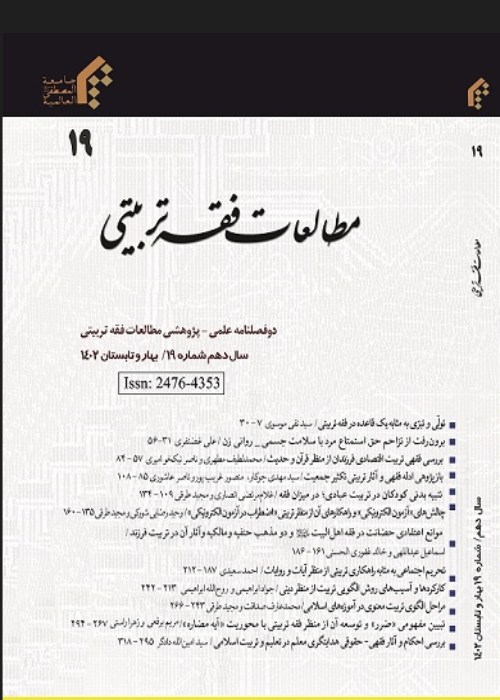فهرست مطالب
مجله مطالعات فقه تربیتی
سال ششم شماره 16 (پاییز 1390)
- ویژه تربیت اخلاقی
- تاریخ انتشار: 1390/10/11
- تعداد عناوین: 9
-
صفحه 9
- مقالات
-
صفحه 23
-
صفحه 177
-
صفحه 205
-
صفحه 217
-
Page 23The main educative goal of the Holy Quran, revealed with the purpose of nurturing the essence of humanity inside the worldly man, is to realize the moral virtues. This celestial book, which is a divine document and the treasure of morality and knowledge, presents some theoretical and practical teachings which make up a system wherein the man becomes a perfect moral being. Thus, studying morality with the centrality of the Quran, along with making use of the moral treasure existing among the Muslims as well as the capacities of various sciences, prepare the ground for new researches. What you see in the present article is an attempt for extracting the moral verses and thematic classification of them. Therefore, the sections presented in this article with the purpose of acquiring these goals are as follows: introduction, classification of the Quranic teachings, the relationship between morality and the Quran, the background of the subject, the criterion for classifying the Quranic moral verses, the themes of the Quranic moral verses, and the conclusion.Keywords: the Quranic moral verses, the criterion for classifying the Quranic verses, moral thesmes
-
Page 49God Almighty created the man and prepared the means for guiding him by sending prophets and divine books. The need for morality and right deeds as well as the man’s innate tendency towards virtues, happiness and perfection have caused God to make the ways for achieving them available to all human beings. In Islam’s view, morality is a component of religion, and takes its basics, principles and methods from religion. Through precisely explaining the basics, principles and methods of moral education, Islam plays a major role in reforming the man’s mind and soul. Islam presents complete examples of virtue and perfection to the man, leaving him free in choosing among them. Besides presenting the basics, Islam has a marvelous effect in presenting the principles and methods of acquiring moral virtues and removing moral vices. To recognize the basics and principles, Islam has stated some methods the most important of which are as follows: the method for presenting insight, the method of studying and thinking, the method of remembering and reminding divine blessings, the method of equilibrium and balance, the method of forebearance, the method of creating motivation and the exemplar method. Through exerting these methods, the edu cator and the educated can acquire moral virtues and remove moral vices and obstacles, attempting to execute divine instructions in the moral domain.Keywords: moral education, morality, education, the goals of education, the method of education
-
Page 83How have the holy Prophet and the Imams behaved towards their opponents and dissidents? With leniency and tolerance or with intolerance and cruelty? In the present article, it is shown that the Impeccable had used leniency and tolerance as their primary principle in their attitude towards their opponents. The present article has tried to deal with the Impeccable’s moral education against their opponents and dissidents. In the Impeccable’s attitude, the opponents and the enemies are human beings in wrong way, who must be guided to the right path; and the most important duty of the divine prophets and saints (and that of all religious governments) is to prepare the ground for guiding human beings and showing them the way of truth and rightness. In the Impeccable’s view, the man is the noblest creature and it is necessary for all to respect any human being, no matter what his belief and religion is. The most important element in respecting a man is protecting his life; and those bloods shed undeservedly are the first things questioned on the Judg ment Day. In their moral attitude based on their religious beliefs and doctrines, the Impeccable would respect their opponent’s freedom and thought, not resorting to insulting and outrage; they would remain committed to moral principles even in the most critical conditions of war. The present research deals first with the status of the principle of tolerance and the principles governing the Impeccable’s moraleducative behavior in treating their opponents, and then gives some examples of their treating the opponents. It then investigates and discusses their way of life in attracting the opponents and dissidents. Finally, it states the role of morality, knowledge and awareness, and the moral-social power in attracting the opponents.Keywords: the Impeccable's way of life, morality, opponents, tolerance, the holy Prophet, Imam Ali
-
Page 121Education and morality are two separate categories, and each one is an independent science with a close relationship and a mutual effect with the other one. Moral education is ‘nurturing human soul in the path of commitment to what must morally be done and what must not, and paying attention to acquisition of virtues and avoiding vices in order to achieve felicity and enjoying the unlimited and permanent [spiritual] pleasures’. The children and teenagers, from the very day they start education, begin their golden opportunity for acquiring knowledge, which then continues up to the highest stages of education. What goes on now in the educational centers is the direct teaching of morality and religious knowledge, not the moral education. The educational system for teaching morality requires revision and modification; but furthermore, a new project must be planned for moral education of the teenagers and youths, which is a category independent of teaching morality. In teaching the science of morality, just as other scientific educations, teaching directly is inescapable; in moral teaching, however, only the indirect method is effective. The main condition for the success of a moral teacher and an educator of the society is his/ her being educated and nurtured, and teaching others must be done through action and behavior and not mere speech.Keywords: teaching, education, direct education, indirect education, morality, moral education


